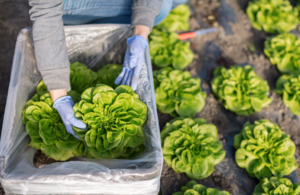Increased government funding to boost farming productivity
More than £168m to drive innovation, improve productivity and support animal health and welfare through greener equipment, robotics and automation.

Getty images
More than £168 million in grants will be available to farmers this year to drive innovation, support food production, improve animal health and welfare and protect the environment.
Speaking at the National Farmers’ Union conference in Birmingham, Farming Minister Mark Spencer will set out how the grants will drive the development of new technology and innovative ways of farming, with a focus on practical solutions that advance food productivity and deliver significant environmental and animal welfare benefits.
These could include robotic technology to support with harvesting, handling equipment and cow mattresses to help prevent lameness in dairy cattle, sensors on tractors to measure the levels of nutrients in soils, or improvements to slurry storage - to further the efforts of farmers aiming to minimise their fertiliser use, and in turn reduce water and air pollution.
The grants, delivered through the Farming Innovation Programme (FIP) and Farming Investment Fund (FIF), will sit alongside the Environmental Land Management schemes which pay farmers for a diverse range of actions such as managing hedgerows for wildlife, planting nectar-rich wildflowers and managing crop pests without the use of insecticides.
Every year animal sickness, such as lameness in cattle, leads to the loss of thousands of livestock which in turn decreases productivity and contributes to farm emissions. New dedicated funding for annual vet-led health and welfare checks for livestock and money to support farmers implement improvements following these visits has been announced through the Animal Health and Welfare Pathway. Farmers interested in the vet visit can now register their interest.
Taken together, these schemes and grants will help to deliver long-term sustainable food production and support farmers to halt and reverse the decline of nature as set out in the Environmental Improvement Plan.
Speaking at the NFU conference, Farming Minister Mark Spencer said:
The role farmers play in putting food on our tables as well as looking after our countryside is crucial. We know that sustainable food production depends on a healthy environment, the two go hand in hand.
Helping farms invest in new technology as well as bringing in nature-friendly schemes will support the future of farming.
Today’s funding forms part of the government’s commitment to spend around £600 million on grants and other support for farmers to invest in productivity, animal health and welfare, innovation, research and development over three years, funded out of the £2.4 billion annual farming budget which is being maintained at its current level for the rest of this Parliament.
It follows a series of significant announcements by the government on future farming policy in England.
Since the start of the year, the government has set out detailed plans for the nation’s farming sector, supporting farmers to be profitable and resilient as they produce food sustainably while improving animal health and welfare and the environment upon which farming depends. This included accelerating the rollout of the Sustainable Farming Incentive, with six new standards for 2023, and setting out detail on what farmers will be paid to deliver through our enhanced Countryside Stewardship scheme.
The government has increased payments to farmers for protecting and enhancing nature and delivering sustainable food production through both a Sustainable Farming Incentive Management Payment worth up to £1,000 per year per farm and increased payment rates through Countryside Stewardship.
More than 2,000 farmers now have live agreements as part of the Sustainable Farming Incentive, while more than 32,000 farmers are signed up to Countryside Stewardship – a 94% increase since 2020.
Support for smaller abattoirs
The Government has also confirmed it plans to introduce funding to promote enhanced productivity, innovation and improved animal health and welfare in smaller abattoirs.
Speaking at the NFU conference, Farming Minister Mark Spencer said:
If farming is to flourish then we need to get the fundamentals right - abattoirs are key to the food supply chain and there is clearly a need to support smaller providers in this area.
The availability of funding will help abattoirs to invest in new technology and improve productivity and animal health and welfare, allowing our agriculture sector to get its high-quality produce to market.
There has been a 20% reduction in the number of low-capacity abattoirs in the last decade. A network of smaller abattoirs distributed around the country is crucial to supporting the rural economy, enabling farmers to sell their own meat in farm shops and maintaining good animal health and welfare through reduced journey times to slaughter.
At a recent roundtable, the minister met with the sector and discussed the issues they are facing. The new funding, to be announced in full later this year, will help those abattoirs to add value by supporting the availability of local produce, providing specific equipment to support the rearing of rare and native breeds, encouraging rural employment, and safeguarding the food supply chain through a diverse and productive abattoir sector.
Jan Devos, a horticulturalist from Blue Ribbon Plants in Chichester, received a grant of over £3600 last year for a rainwater catching and filtration system. She said:
It’s been great for cashflow and to move the business forward.
It’s really helped us to modernise and be a more sustainable operation.
Over £4800 was awarded to Richard Dew, a dairy and sheep farmer from Bude, to help purchase a plate heat exchanger for cooling milk, a mobile sheep handling system and a rotating cow brush.
The cow brush for my cattle has really helped improve the herd’s health and welfare for the better.
It means I am producing better product from my animals and it’s made a positive impact on my business.